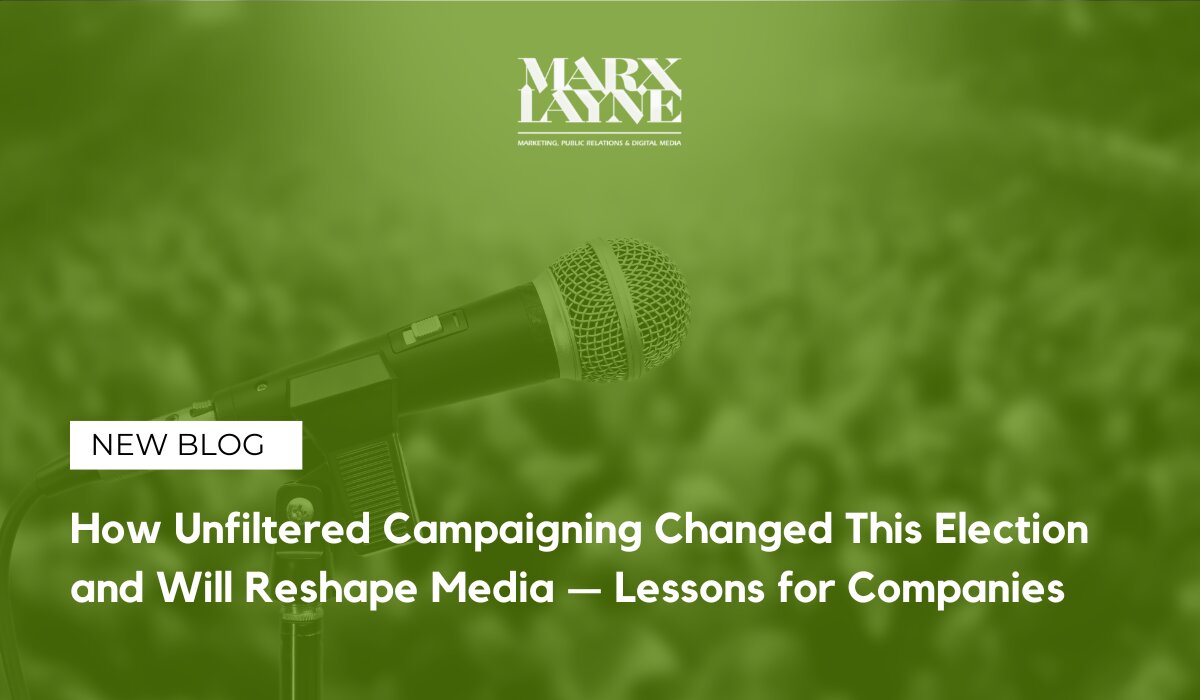
November 11, 2024
How Unfiltered Campaigning Changed This Election and Will Reshape Media — Lessons for Companies
This recent election has revealed a striking shift in political communication: the rise of unfiltered campaigning. With candidates bypassing traditional media and engaging directly with their audiences through raw, immediate communication, this shift has not only altered campaign dynamics but is also poised to reshape the role of media in politics. For businesses, these changes highlight new communication strategies and pitfalls to consider when engaging with the public.
Written by Michael Szudarek
This recent election has revealed a striking shift in political communication: the rise of unfiltered campaigning. With candidates bypassing traditional media and engaging directly with their audiences through raw, immediate communication, this shift has not only altered campaign dynamics but is also poised to reshape the role of media in politics. For businesses, these changes highlight new communication strategies and pitfalls to consider when engaging with the public.
The Appeal of Direct, Unpolished Messaging
Unfiltered campaigning is powerful for its authenticity. Political figures who sidestep traditional media to deliver messages directly to voters gain control over their narrative. The messages are often raw, sometimes divisive, and crafted to bypass formalities, speaking instead to emotions and values. For companies, the lesson here is clear: consumers are increasingly drawn to brands that communicate transparently and directly. Consider how some companies have built strong, loyal followings through platforms like TikTok and Instagram, where they can showcase their products, values, and culture without the polish of traditional advertising. The takeaway for brands is to adopt authenticity without sacrificing professionalism or integrity. Real, relatable communication fosters trust but must align with a brand's values and standards.
New Roles for Media and Content Creators
With more political candidates and figures creating their own content, traditional media has been forced to adapt. Rather than simply broadcasting campaigns, media outlets now find themselves fact-checking, analyzing, and curating content to maintain relevance and uphold accountability. This shift to analysis over raw reporting allows media to preserve its influence as a trusted source, albeit in a different capacity.
For companies, this shift suggests a reevaluation of how they interact with content creators and media channels. Working alongside influencers and brand ambassadors, companies can adopt an unfiltered approach with higher levels of authenticity. However, establishing credibility through informed and engaging content is essential. As in politics, any disconnect between messaging and truth can erode consumer trust.
The Risks and Rewards of Bypassing Traditional Filters
While direct, unfiltered campaigning has its advantages, it also carries risks. Messages that spread unchecked can lead to misunderstandings or even backlash if audiences perceive them as misleading or inflammatory. Political figures, as well as brands, must tread carefully to avoid alienating followers with controversial content or overly aggressive positioning. For businesses, this is a lesson in the importance of balanced messaging. Companies that choose to communicate without the traditional “filters” of PR and marketing teams must carefully consider the impact of their words. Unfiltered does not mean unregulated; it’s crucial for brands to have a strategic approach to message delivery, ensuring alignment with company ethics and audience values. Missteps, particularly on social media, can quickly go viral and damage a brand’s reputation.
Navigating a New Media Landscape
As traditional media’s role shifts from that of a gatekeeper to more of a curator and analyst, companies, too, will need to adapt to an ever-evolving media landscape. Embracing digital media’s instantaneous nature allows companies to better reach their audiences directly, but understanding the nuances of various platforms and leveraging analytics is equally important. For companies, mastering this landscape means investing in digital literacy and understanding the analytics that guide audience engagement. This will help refine messages, identify the best platforms for reaching target demographics, and adjust strategies to maximize effectiveness. Just as political campaigns now must use data to guide unfiltered engagement, companies too must rely on insights to guide their direct-to-consumer approaches.
Lessons Companies Can Take Away
- Authenticity Builds Trust: Consumers appreciate genuine communication. Companies that embody transparency and personality in their messaging stand to gain stronger loyalty, just as political figures do.
- Balanced Messaging is Key: While bold statements can capture attention, maintaining professionalism and honesty is crucial. Avoid alienating or misleading your audience.
- Adapt to the Media Landscape: The media ecosystem is shifting, and companies should invest in understanding social media, influencer marketing, and analytics to stay relevant.
The rise of unfiltered communication will continue to challenge both political figures and companies to refine their strategies for a digital world. By embracing authenticity, navigating risks carefully, and engaging directly with their audiences, brands can adopt the best practices of this new era while safeguarding their reputation and integrity.
Share This Story, Choose Your Platform!
Marx Layne is your competitive advantage.
Your reputation and success are our only concerns.
